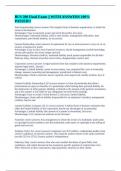BUS 200 Final Exam || WITH ANSWERS 100%
PASSED!!
Sole Proprietorship correct answers The simplest form of business organization, in which the
owner is the business.
Advantages: Easy to start/end, owner gets all of the profits, less taxes.
Disadvantages: Unlimited liability, hard to raise money, management difficulties, time
commitment, poor health benefits, no succession.
General Partnership correct answers An agreement by two or more persons to carry on, as co-
owners, a business for profit.
Advantages: Easy to start, more financial resources, shared management, pooled knowledge,
owners split profits, less taxes, longer survival.
Disadvantages: Personal conflicts, unlimited liability (each partner responsible for all debt -
fiduciary duty), division of profits can be tricky, disagreements, hard to end.
Corporation correct answers A legal business form that complies with statutory requirements;
separate legal entity, "person."
Advantages: Limited liability, easier to raise money, size, perpetual life, ease of ownership
change, separate ownership and management, jurisdiction in federal court.
Disadvantages: Hard to start/end, lawyer required, more paperwork, double taxation, loss of
control.
Limited Liability Partnership (LLP) correct answers A form of partnership that allows
professionals to enjoy tax benefits of a partnership while limiting their personal liability for
the malpractice of other partners (liability is limited to the amount of the partner's investment,
and a new partner is not liable for any obligations incurred before joining).
Advantages: Easy to create ("check the box"), less taxes, limited liability.
Disadvantages: Some add-on liability (responsible for an employee's mistake), management
conflicts, hard to end.
Limited Liability Company (LLC) correct answers A hybrid form of business enterprise that
offers the limited liability of the corporation, but the tax advantages of a partnership.
Advantages: Limited liability (the amount of a partner's investment), less taxes.
Disadvantage: LLC statutes not uniform across all states.
Franchise correct answers Any arrangement in which the owner of a trademark, trade name,
or copyright licenses another to use that trademark, trade name, or copyright in the selling of
goods and services.
Sarbanes Oxley Act correct answers Companies over $75 million - independent auditor must
certify to adequacy of internal controls. The corporate auditor reports to the audit committee
(not the CEO or CFO.) Ensures auditor's independence.
Fiduciary Duty correct answers One who owes another the duties of good faith, trust,
confidence, and candor because he has assumed a specific position of control (due care).
Who? Directors to their corporations, legal guardians, attorneys to their clients.
, SEC Quarterly Reports correct answers Companies are required to file quarterly reports with
the SEC. The CEO is now required to attest to their accuracy. If he is wrong, he could face
criminal charges if it was not an honest mistake.
Insider Trading & Remedies correct answers Employees/directors and officers are barred
from using insider knowledge to buy/sell to the disadvantage of the general public.
Legal elements: 1. Sale or purchase of a security; 2. Breach of fiduciary duty or relationship
of trust, while in possession of material, nonpublic information about the security.
Remedies: Disgorgement - the corporation recaptures all the profits made by the insiders
within 6 months (even without showing that the inside information itself yielded the profit),
and some criminal penalties apply - imprisonment of up to 20 years, individual fines of $5
million (or $25 million for a corporation).
Sherman and Clayton Acts correct answers Prohibit contracts "in restraint of trade," and
make it a felony to "monopolize or attempt to monopolize any part of commerce among
States or with foreign nations."
Types of violations: Price fixing, "carving-up" territories, predatory pricing, price
discrimination, "tying" arrangements, mergers, exclusive-dealing contracts, manufacturer
dictating the price a distributor must charge (setting a max = okay).
Commerce Clause correct answers Gives Congress the power to regulate commerce between
the states and with foreign countries. Courts through caselaw have extended this to commerce
inside states that affects interstate commerce.
Wickard v. Filburn - Increased the power of the federal government to regulate economic
activity. Filburn's production of more wheat than he was allotted was affecting interstate
commerce.
Dormant Commerce Clause correct answers A court construction; if Congress controls
interstate commerce, then states lack the power to do things that favor their own business
interests over those outside the state.
Commerce Clause Usage correct answers Tied to some government action; either someone is
alleging Congress has gone too far by passing some law that affects commerce, or someone is
complaining that a state or lesser governmental entity has created a protectionist law.
Gonzalez v. Raich - Congress may ban the use of marijuana even where states approve its use
for medicinal purposes.
Heart of Atlanta Hotel v. U.S. - Congress could use the power granted to it by the Commerce
Clause to force private businesses to abide by the Civil Rights Act of 1964.
Granholm v. Heald - Ruled that laws in New York and Michigan that permitted in-state
wineries to ship wine directly to consumers, but prohibited out-of-state wineries from doing
the same, were unconstitutional.
Pike v. Bruce Church - Held that power of states to pass laws interfering with interstate
commerce is limited when the law poses an undue burden on businesses.
Commerce Clause Test correct answers 1. Does the regulation or law discriminate?
2. If so, how?
3. How big is the burden?
4. Is a legitimate (compelling) public interest being protected that cannot be otherwise
adequately served by nondiscriminatory alternatives?
(Applies anytime the Constitution is in play).




